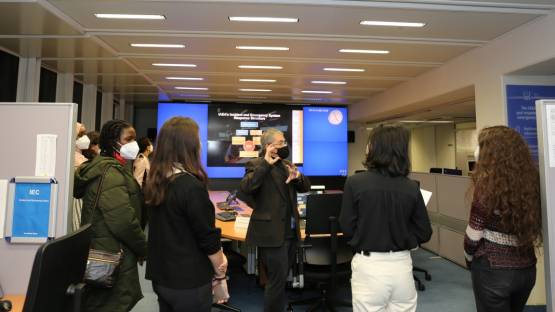Until two years ago, Geraldyne Ule Duque could not imagine she would get to learn about nuclear security at the IAEA in Vienna. Last month she did just that.
A fascination with nuclear science and energy from a young age led the Colombian to study physics with a focus on nuclear reactors in her home country. Seeking to gain a wider perspective abroad, Ule Duque applied for and has recently graduated with a master’s degree in medical physics from the University of Valencia, Spain, an opportunity made possible by the Marie Sklodowska-Curie Fellowship Programme — a scheme designed to provide young women with financial support and experience to complete degrees in the nuclear sector, addressing gender imbalance.
“Entering the nuclear field as a woman was challenging, but the scholarship has enabled me to come to Europe for the first time, continue my studies in a subject I am passionate about and even helped me gain the opportunity to pursue an internship and start a career as a young professional in the nuclear field,” said Ule Duque, one of the scholarship holders who attended the international school on nuclear security at the IAEA and complemented their master’s studies with practical lessons on nuclear security.
Funded by a contribution from the European Union, this is the first school organised by the IAEA for Marie Sklodowska-Curie Fellowship Programme participants.
“We were impressed by how excited, passionate and knowledgeable the students were. A further evidence that there is a great benefit to attract students from diverse backgrounds to the nuclear sector,” said Lydie Evrard, Deputy Director General and Head of the Department of Nuclear Safety and Security, the first woman to hold this post. “The International School on Nuclear Security is one of the most prominent IAEA capacity building activities in the field of nuclear security.”
A seminar on the key legal instrument for nuclear security, the Convention on the Physical Protection of Nuclear Materials and its Amendment (A/CPPNM) will follow, with the aim to provide students with additional insights on the importance of this key nuclear security instrument.
The nuclear industry relies heavily on a specialised and highly trained workforce. Many countries face the challenge of ensuring an adequate and sustained pipeline of qualified nuclear professionals to meet the demands of their nuclear energy sectors, underscoring the need to develop young talent in this area.
The school, which ran for two weeks, provided students with the opportunity to meet and network with both their peers and experienced nuclear specialists. Faculty members and professionals from leading institutes around the world gave presentations and conducted practical exercises on various areas related to nuclear security. “It is fundamental to develop a safe and shared space where women in the nuclear field can create strong networks and voice the diverse knowledge they bring to the table,” said Kathleen Heppell-Masys, Director General of the Directorate of Security and Safeguards at the Canadian Nuclear Safety Commission who was one of the invited experts for the school. “When I first entered the nuclear field more than 25 years ago, there was no such opportunity. Since then, I have seen the way we are growing as an industry with diverse thinking and new innovations, which is only possible with an inclusive workforce.”
From laboratory visits and technical demonstrations to theoretical lectures on nuclear security, the school is a unique opportunity for students to gain an overview of career options in nuclear.
“Developing specialists needed in the nuclear sector requires considerable effort and time,” said Mikhail Chudakov, IAEA Deputy Director General. “This is why it is so crucial for young women to better understand and enter the nuclear field: diversity is key for innovation!”







